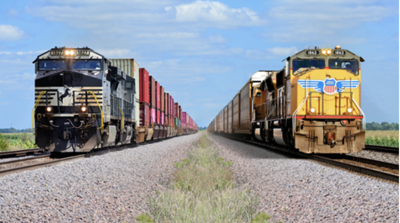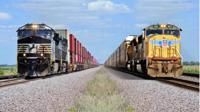Union Pacific Corporation and Norfolk Southern Thursday announced a widely rumored agreement calling for Norfolk Southern to be acquired in an $85 billion deal.
Union Pacific is the nation's largest railroad, with Norfolk Southern in the number four spot.
If approved by the U.S. Surface Transportation Board, the railroad would operate coast to coast, with more than 50,000 miles of track in 43 states and have access to more than 100 ports, including the Port of Wilmington.
Under the terms of the agreement, Union Pacific will acquire Norfolk Southern in a stock and cash transaction. Both companies have posted strong profits thanks to increasingly efficient operations, a far cry from the condition of the railroad industry a half century ago.
At that time, passenger service was a money-losing proposition for railroads that were also struggling with labor costs and competition from truck transport. The turmoil led to the U.S government forming Amtrak to operate passenger rail service.
Amtrak has struggled with delays on its system, which uses Union Pacific and Norfolk Southern tracks on long-distance trains. The Northeast Corridor route, which passes through Newark and Wilmington, is owned by Amtrak.
“Railroads have been an integral part of building America since the Industrial Revolution, and this transaction is the next step in advancing the industry,” said Jim Vena, Union Pacific CEO. “Imagine seamlessly hauling steel from Pittsburgh, PA to to Colton, CA and moving tomato paste from Heron, CA to Fremont, Ohio. Lumber from the Pacific Northwest, plastics from the Gulf Coast, copper from Arizona and Utah, and soda ash from Wyoming. Right now, tens of thousands of railroaders are moving almost everything we use. You name it, and at some point, the railroad hauled it.”
A release stated that the companies aim to be the safest railroad in North America and be able to better compete with trucks, noting that the two railroads spend a combined $5.6 billion annually in infrastructure, innovation, and network expansion.
“Norfolk Southern, like Union Pacific, is a railroad integral to the U.S. economy, with a storied 200-year legacy of serving customers across 22 states in the eastern half of the nation,” said Mark George, CEO of Norfolk Southern. “Our safety, network, and financial performance is among the best we’ve had as a company, as is our customer satisfaction.
A release announcing the merger "waved the flag" stating that the transcontinental railroad will compete more effectively with Canadian lines to win back U.S. freight volume and American jobs.
Safety was also mentioned, with Norfolk Southern taking heat for a derailment in Ohio that led to toxic releases. The railroad industry has been the target of criticism over safety issues and workplace practices although derailments have decreased over the years.
Critics have claimed that the handful of surviving large railroads have not invested enough in tracks and other equipment.
Both Norfolk Southern and Union Pacific were merger winners in recent decades as railroads combined after a turbulent period that included the demise of Penn Central Railroad which for a time became Conrail. Conrail was later sold and split up by its U.S. government owner, with CSX and Norfolk Southern acquiring its assets.
Norfolk Southern and other railroads have also sold off less profitable branch lines, including a Delmarva route that is now operated as Delmarva Central under the ownership of Carload Express.
Talk of a transcontinental railroad that came during the merger wave cooled after Union Pacific struggled with shipment delays while combining operations in a merger with Southern Pacific.
To the north, the Canadian Pacific and Canadian National bought railroads in New England and the Midwest. CP recently acquired Kansas City Southern which operates a lucrative Midwest-Mexico route.
Norfolk Southern and Union Pacific expect to file their application with the Surface Transportation Board within six months.
The companies are targeting closing the transaction by early 2027.
Based on 2024 results, the combined company would have revenues of approximately $36 billion and have earnings before cash and other expenses of about $18 billion and free cash flow of $7 billion.
The combined company will be headquartered at Union Pacific's headquarters in Omaha. Atlanta, headquarters for Norfolk Southern, will remain a core location, according to a release.











(0) comments
Welcome to the discussion.
Log In
Keep it Clean. Please avoid obscene, vulgar, lewd, racist or sexually-oriented language.
PLEASE TURN OFF YOUR CAPS LOCK.
Don't Threaten. Threats of harming another person will not be tolerated.
Be Truthful. Don't knowingly lie about anyone or anything.
Be Nice. No racism, sexism or any sort of -ism that is degrading to another person.
Be Proactive. Use the 'Report' link on each comment to let us know of abusive posts.
Share with Us. We'd love to hear eyewitness accounts, the history behind an article.